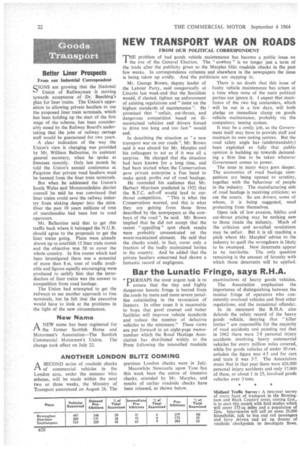Better Liner Prospects
Page 24

If you've noticed an error in this article please click here to report it so we can fix it.
From our Industrial Correspondent QIGNS are growing that the National Union of Railwaymen is moving tiowards acceptance of Dr. Beeching's pllan for liner trains. The Union's opposition to allowing private hauliers to use the proposed liner train terminals, which has been holding up the start of the first stage of the scheme, has been considerably eased by the Railway Board's undertaking that the jobs of railway cartage staff would be guaranteed for two years.
A clear indication of the way the Union's view is changing was provided by Mr. William Ballantine, its assistant general secretary, when he spoke at Swansea recently. Only last month he told the Union's annual conference at Paignton that private road hauliers must be banned from the liner train terminals.
But when he addressed the Union's South Wales and Monmouthshire district council he said he was convinced that liner trains could save the railway industry from sinking deeper into the mire. Over the past 10 years millions of tons of merchandise had been lost to road operators.
Mr. Ballantine said that to get this traffic back where it belonged the N.U.R. should agree to the proposals to get the liner trains going. Plans were already drawn up to establish 15 liner train routes and the objective was 50 to cover the whole country. In five routes which had been investigated there was a potential of more than 8 rri. tons of traffic available and figures equally encouraging were produced to satisfy him that the introduction of liner trains was the answer to competition from road haulage.
The Union had attempted to get the railways to see another approach to free terminals, but he felt that the executive would have to look at the problems in the light of the new circumstances.
































































































































